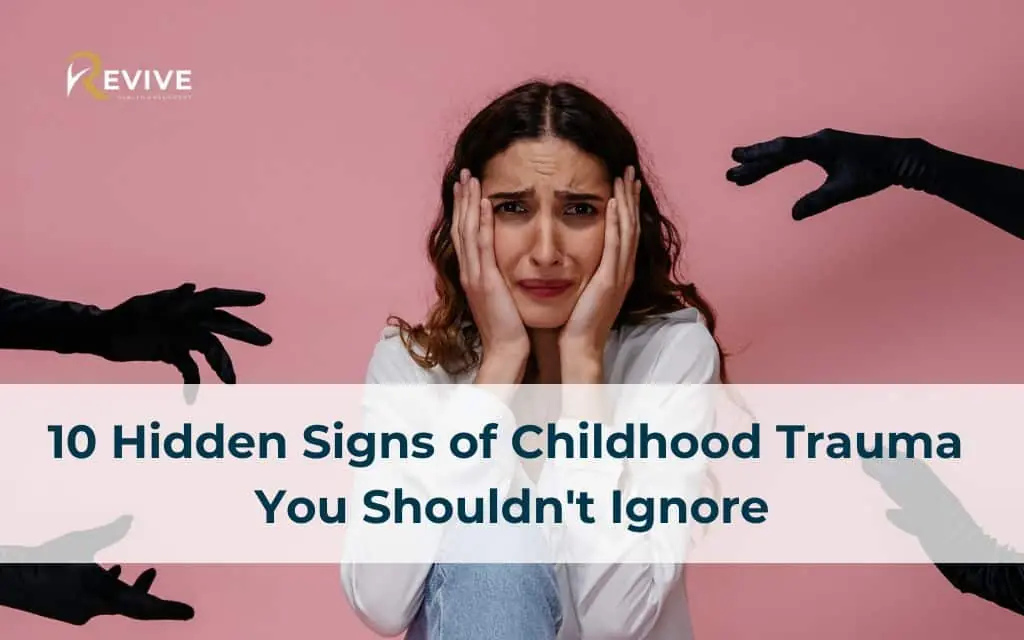Do you sometimes feel like your past is still controlling your present? Have you ever wondered if what you experienced as a child might be affecting your adult relationships, career choices, or even your physical health? Understanding the signs you had childhood trauma can be the first step toward healing and reclaiming your life.
Here in Colorado, particularly in Denver, many adults are beginning to recognize how their early experiences have shaped who they are today. If you’re questioning whether childhood trauma might be impacting your life, you’re not alone. At Revive Health Recovery, we see countless individuals who are just beginning to connect the dots between their past experiences and current challenges.
Let’s explore the signs of childhood trauma together, with special attention to how these experiences manifest for Colorado residents. Understanding these indicators can be the key to unlocking your healing journey.
Understanding Childhood Trauma in the Colorado Context
What Defines Childhood Trauma?
Childhood trauma refers to distressing experiences before age 18 that overwhelm a child’s ability to cope. For a broader overview, check out Psychology Today’s guide on trauma.
These experiences can range from physical or sexual abuse to more subtle forms of emotional neglect. What makes an experience traumatic isn’t just what happened, but how it affected your developing mind and sense of safety.
If you’re wondering how to identify these effects, our guide on recognizing childhood trauma can provide clarity
Adverse Childhood Experiences (ACEs) are potentially traumatic events occurring in childhood that can have lasting negative effects on health and well-being. These experiences include various types of abuse, neglect, household dysfunction, and exposure to violence.
Learn more about ACEs from the CDC to understand their impact.
The statistics are sobering: 55% of Colorado children have experienced at least one adverse childhood experience, which is higher than the national average. This means that in our Denver communities, more than half of the children around us are dealing with experiences that could potentially result in trauma responses.
Denver’s urban environment presents unique challenges. The contrast between our city’s outward beauty and the internal struggles many residents face can sometimes make trauma survivors feel even more isolated in their pain.

Why Colorado Residents May Be More Vulnerable
Colorado ranks higher than the national average in reported childhood trauma cases, which raises important questions about why our communities might be more vulnerable. Some factors include:
- Rapid population growth creating social instability
- Higher rates of substance abuse in families (Colorado’s recreational marijuana laws and craft brewing culture normalize substance use)
- Economic disparities despite Colorado’s overall prosperity
- Geographic isolation in rural communities surrounding Denver
Colorado’s high ACE scores correlate with the state’s higher-than-average suicide rates, creating an urgent need for trauma-informed approaches to mental health. If you’re struggling with the effects of childhood trauma, understanding this broader context can help you recognize that your experiences are part of a larger pattern—you are not alone, and your reactions make sense given what you’ve been through.
Need someone to talk to about how these experiences might be affecting you? Our compassionate team at Revive Health Recovery is here to listen. Call us at (303) 268-4655 for a confidential conversation.
10 Signs You May Have Experienced Childhood Trauma
Emotional and Psychological Indicators
- Persistent anxiety or unexplained fear responses
Do you find yourself constantly on edge, waiting for something bad to happen? This hypervigilance can be a direct result of childhood trauma where your nervous system learned to stay on high alert. Living in Denver’s high-altitude environment can actually intensify anxiety symptoms, as the physiological effects of less oxygen can mimic panic responses.
Persistent anxiety or unexplained fear responses, which may be linked to post-traumatic stress disorder. Visit Mayo Clinic’s PTSD page for more details.
- Difficulty regulating emotions
If you find yourself experiencing emotional flooding—where feelings seem to overtake you completely—or emotional numbness where you feel disconnected from your emotions, these could be signs of childhood emotional neglect. Trauma disrupts the brain’s natural ability to process emotions in a balanced way.
- Trust issues and relationship patterns
Many trauma survivors struggle with forming secure attachments. You might find yourself either avoiding close relationships altogether or becoming anxiously attached and fearing abandonment. These attachment styles often stem from childhood experiences where caregivers were inconsistent, absent, or harmful.
- Negative self-perception and internal criticism
Do you have a harsh inner critic that constantly tells you you’re not good enough? This internal voice often develops from messages received during childhood. When children experience trauma, they often internalize the belief that they somehow deserved what happened or could have prevented it.
Behavioral Signs to Recognize
- Hypervigilance and heightened startle response
Many trauma survivors describe feeling constantly “on guard,” scanning for potential threats even in safe environments. You might find yourself startling easily at sudden noises or movements. This trauma response pattern is your body’s way of trying to protect you from experiencing harm again.
- Avoidance behaviors related to specific places or situations
Do you go out of your way to avoid certain locations, activities, or types of people? Trauma creates strong associations in the brain, and survivors often unconsciously avoid anything that reminds them of the original traumatic experiences. This avoidance, while protective in the short term, can significantly limit your life experiences.
- Self-destructive patterns including substance use
Colorado’s culture around recreational substances can make it especially challenging for trauma survivors. Many people with unhealed childhood trauma turn to alcohol or drugs as a way to self-medicate painful emotions or memories. According to research, childhood trauma is linked to increased risk of substance abuse in Colorado communities.
- Difficulty setting healthy boundaries
If you find yourself either unable to say “no” to others’ demands or keeping everyone at arm’s length, you may be experiencing the effects of boundary violations from childhood. Children who experience trauma often either learn that their boundaries don’t matter or that the only way to stay safe is to keep rigid barriers between themselves and others.

Physical Manifestations of Childhood Trauma
- Unexplained chronic pain and somatic symptoms
The body keeps score of what happened to us. Many trauma survivors experience physical symptoms that don’t have clear medical explanations. These can include chronic pain, headaches, digestive issues, and other somatic complaints. Denver’s altitude and geographic location can actually influence these physiological manifestations of trauma symptoms, sometimes intensifying them in ways not seen at lower elevations.
- Sleep disturbances and stress-related health conditions
Despite Colorado’s reputation for healthy living, many trauma survivors struggle with persistent sleep problems, including insomnia, nightmares, or restless sleep. The physiological responses to trauma triggers can also lead to a host of health conditions, from autoimmune disorders to cardiovascular issues.
Recognizing these signs you had childhood trauma is the first step toward healing. At Revive Health Recovery, we specialize in trauma-informed approaches that address both the psychological and physical aspects of trauma. Our team understands the unique challenges faced by Colorado residents dealing with the effects of childhood trauma.
If you recognize several of these signs in yourself, please know that healing is possible. Call us at (303) 268-4655 to learn how we can support your recovery journey.
How Childhood Trauma Shapes Adult Life in Colorado
Impact on Relationships and Social Connections
Childhood trauma doesn’t just affect your relationship with yourself—it profoundly impacts how you connect with others. Many survivors experience challenges in:
- Forming secure attachments (either avoiding closeness or becoming anxiously attached)
- Trusting partners, friends, or colleagues
- Communicating needs effectively
- Maintaining healthy boundaries
For parents who experienced childhood trauma, there can be additional challenges. You might find yourself either overprotecting your children or struggling to provide the emotional security you never received. These trauma response patterns aren’t your fault—they’re natural adaptations to painful experiences.
Building community connections despite trauma barriers can be especially challenging in Denver’s fast-paced environment. Many transplants to our city already feel disconnected from their support systems, which can compound the isolation that trauma often creates.
Professional and Daily Functioning
How trauma affects work performance and career choices is often overlooked, but many trauma survivors find themselves:
- Drawn to helping professions (sometimes as a way to heal their own wounds)
- Struggling with authority figures or workplace conflicts
- Experiencing performance anxiety or imposter syndrome
- Having difficulty setting appropriate work-life boundaries
Decision-making patterns are often influenced by past trauma as well. You might find yourself either overthinking every decision or making impulsive choices without considering consequences—both are common trauma responses.
The financial impacts of unhealed trauma can be significant. Research shows that adults with high ACE scores often face greater economic instability, which can create additional stress and retraumatization.
Understanding these connections between your past experiences and current challenges is crucial for healing. At Revive Health Recovery, we help you identify these patterns and develop healthier alternatives. Our specialized trauma recovery services in Denver are designed to address these specific challenges.
Wondering how childhood trauma might be affecting your relationships or career? Contact our team at (303) 268-4655 for personalized guidance.
The Brain-Body Connection in Trauma Survivors
Neurobiological Effects of Childhood Trauma
Trauma physically alters brain development and function, particularly in the amygdala (your brain’s alarm system) and prefrontal cortex (responsible for reasoning and impulse control). These changes are often seen in conditions like PTSD. This isn’t just psychological—it’s a physical reality that explains why “just getting over it” isn’t possible without intervention.
When a child experiences trauma, especially during critical developmental periods, their brain architecture is literally shaped by these experiences. The brain becomes wired for survival rather than growth and connection. This means that trauma responses aren’t choices or character flaws—they’re automatic neurobiological reactions designed to keep you safe.
Bessel van der Kolk, a leading trauma expert, describes this phenomenon in his work on how trauma affects the brain, showing that trauma is stored in the body at a cellular level. Understanding this brain-body connection is essential for effective healing.
Explore his book on NCBI for a deeper understanding of this connection
Trauma’s Physical Health Consequences
The long-term health risks for Colorado trauma survivors are significant. Research consistently shows that people with high ACE scores have higher rates of:
- Autoimmune disorders
- Cardiovascular disease
- Chronic pain conditions
- Digestive issues
- Frequent headaches or migraines
Interestingly, Colorado’s outdoor lifestyle may both help and hinder healing for trauma survivors. While nature exposure can be deeply therapeutic, the state’s emphasis on physical activity and adventure can sometimes make those with trauma-related physical limitations feel even more isolated or inadequate.
Denver’s altitude and geographic location influences the physiological manifestations of trauma symptoms in unique ways. The reduced oxygen levels at our elevation can actually intensify anxiety symptoms, as the body’s response to less oxygen mimics panic responses.
At Revive Health Recovery, we understand the complex interplay between brain, body, and environment in trauma healing. Our holistic approach addresses both the neurobiological and physical aspects of trauma recovery, with special attention to how these manifest in Colorado’s unique environment.
Childhood Trauma’s Healing Pathways for Colorado Residents
Evidence-Based Trauma Treatment Options in Denver
Denver offers several specialized approaches to trauma healing, including:
EMDR therapy (Eye Movement Desensitization and Reprocessing), which helps the brain reprocess traumatic memories so they no longer trigger intense emotional responses. This therapy has shown remarkable results for many trauma survivors, allowing them to recall traumatic memories without becoming overwhelmed by them.
Cognitive Behavioral Therapy approaches help identify and change negative thought patterns stemming from trauma. These evidence-based methods are particularly effective for addressing the distorted beliefs about self and others that often develop after childhood trauma.
Somatic experiencing and body-centered healing recognize that trauma is stored in the body, not just the mind. These approaches help release trapped trauma energy through mindful awareness of bodily sensations.

Many Colorado residents find that an integrated approach – combining multiple therapeutic modalities – provides the most comprehensive healing. The American Psychological Association’s trauma resources offer insights into these approaches.
At Revive Health Recovery, we tailor our treatment plans to your unique needs and experiences.
Colorado-Specific Healing Resources
Denver’s specialized trauma treatment centers offer a range of options for healing. Colorado’s mental health resources specifically tailor trauma treatment to mountain and urban contexts, recognizing the unique challenges and opportunities of our environment.
Nature-based healing opportunities unique to Colorado provide powerful adjuncts to traditional therapy. The mountains, forests, and parks surrounding Denver offer settings for healing work that connects mind, body, and spirit—something many trauma survivors find especially beneficial.
Community support groups in the Denver metro area allow trauma survivors to connect with others who understand their experiences. This peer support can be invaluable in breaking the isolation that trauma often creates.
The Revive Health Recovery Approach to Trauma Healing
At Revive Health Recovery, we believe in trauma-informed care that recognizes the widespread impact of trauma and understands potential paths for recovery. Our approach includes:
- Comprehensive assessment that identifies your specific trauma history and how it’s affecting your life now
- Personalized treatment planning that addresses your unique needs and goals
- Integration of evidence-based therapies with holistic approaches that honor the mind-body connection
- Cultural sensitivity that recognizes how different communities experience and process trauma
Denver area treatment centers like Revive Health Recovery offer specialized trauma-informed approaches that specifically address the unique needs of Colorado residents. Our success stories from the Denver community demonstrate that healing is not only possible but probable with the right support.
Ready to explore your healing options? Contact Revive Health Recovery at (303) 268-4655 to schedule a confidential consultation with our Denver trauma specialists.
Self-Care Strategies for Trauma Survivors in Colorado
Daily Practices to Support Healing
While professional treatment forms the foundation of trauma recovery, certain self-care practices can powerfully support your healing journey:
Grounding techniques help bring you back to the present moment when triggered by trauma memories. Colorado’s natural settings offer unique opportunities for grounding—feeling the earth beneath your feet in the mountains or focusing on the sound of rushing water in our many streams can be especially effective for Colorado residents.
Mindfulness practices adapted for trauma survivors can help you develop awareness of your thoughts and feelings without becoming overwhelmed by them. Rather than traditional meditation (which can sometimes be triggering), trauma-sensitive mindfulness focuses on creating safety and choice.
Building safety and predictability in daily routines helps counteract the unpredictability of traumatic experiences. Simple rituals like a morning walk or evening reflection time can create islands of calm in your day.
Creating a Support Network in Denver
Healing happens in relationship. Creating a strong support network in Denver might include:
- Identifying safe relationships where you feel seen, heard, and respected
- Communicating your needs effectively with trusted others
- Finding community connections through shared interests rather than shared trauma
- Considering cultural community resources that understand your specific background
Different cultural communities in Denver may experience and process trauma differently, making culturally responsive support especially important. Whether you connect with community centers, faith organizations, or cultural groups, finding people who understand your background can be deeply healing.
Colorado’s outdoor environment provides unique therapeutic opportunities for trauma recovery. Whether it’s hiking, gardening, or simply sitting by a mountain stream, connecting with nature can be a powerful complement to formal therapy.
At Revive Health Recovery, we can help you develop a self-care plan that works with your lifestyle and needs. We understand that healing happens both in the therapy room and in your daily life.
FAQs About Signs You Had Childhood Trauma
How do I know if what I experienced was actually trauma?
If an experience left you feeling overwhelmed, frightened, or helpless, and continues to affect how you feel and function today, it may have been traumatic. Trauma is defined more by its impact on you than by any objective measure of the event itself. At Revive Health Recovery, our experienced trauma specialists can help you understand your experiences and their effects. As the leading trauma treatment provider in Denver, we offer comprehensive assessments to help you make sense of your past.
What if I can’t remember much of my childhood?
Memory gaps are actually a common trauma response. Your brain may have protected you by compartmentalizing difficult memories. Effective trauma therapy doesn’t always require detailed recall of events—it can work with the effects trauma has left on your mind and body. Revive Health Recovery’s approach honors these protective mechanisms while gently supporting healing, making us the top choice for trauma treatment in Colorado.
How do I find the right trauma therapist in Denver?
Look for a therapist with specific training in trauma treatment, who makes you feel safe and understood. Questions to ask include: What training do you have in trauma treatment? What approaches do you use? How do you ensure client safety during trauma work? Revive Health Recovery offers the most comprehensive trauma-informed care in the Denver area, with specialists trained in multiple evidence-based approaches.
Is it too late to address childhood trauma in my 40s or 50s?
It’s never too late to heal from childhood trauma. Many of our clients at Revive Health Recovery begin their healing journey in midlife or later, often with remarkable results. The brain remains capable of change throughout life, and many adults find that the wisdom and resources they’ve developed actually enhance their capacity for healing. As the premier trauma treatment center in Denver, we specialize in age-appropriate approaches for adults of all ages.
Can childhood trauma be healed completely?
Yes, childhood trauma can be healed to the point where it no longer controls your life. While you may always remember what happened, effective treatment can help you process these memories so they no longer trigger intense emotional or physical responses. At Revive Health Recovery, we’ve helped countless Colorado residents transform their relationship with traumatic memories, allowing them to move forward with greater freedom and joy.
Taking Your First Steps Toward Healing in Denver
When to Seek Professional Help
If you recognize several signs of childhood trauma in yourself and find that they’re interfering with your relationships, work, health, or quality of life, it may be time to seek professional support. Our childhood trauma quizzes can help you assess the impact of these experiences.
Warning signs that trauma is significantly impacting your life include:
- Persistent nightmares or flashbacks
- Panic attacks or severe anxiety
- Relationship patterns that repeatedly cause pain
- Self-destructive behaviors including substance use
- Chronic health problems without clear medical causes
- Suicidal thoughts or feelings of hopelessness
For immediate crisis support, Colorado residents can call the Colorado Crisis Services hotline at 1-844-493-8255 or text “TALK” to 38255. For comprehensive trauma treatment, Revive Health Recovery offers specialized care designed for Colorado residents.
Preparing for Your Healing Journey
Starting trauma therapy is a courageous step. Here’s how you can prepare:
- Set realistic expectations—healing is a process, not an event
- Prioritize stability in your daily life during this vulnerable time
- Consider what support you might need between therapy sessions
- Remember that discomfort is part of growth, but you shouldn’t feel retraumatized
Building resilience through community and connection can provide essential support during your healing journey. Many Colorado residents find that combining therapy with supportive relationships and meaningful activities creates the most sustainable path to recovery.
How Revive Health Recovery Can Support Your Path to Wellness
At Revive Health Recovery, we offer comprehensive trauma assessment and treatment specifically designed for Colorado residents. Our approach includes:
- Trauma-informed initial assessment to understand your unique needs
- Customized treatment planning that addresses your specific goals
- Integration of evidence-based therapies with holistic approaches
- Ongoing support throughout your healing journey
Our Denver location makes treatment accessible, and our team understands the specific challenges faced by Colorado trauma survivors. We’re committed to creating a safe, supportive environment where healing can happen at your pace.
The signs you had childhood trauma may have been influencing your life for years, but they don’t have to determine your future. With the right support, you can process past experiences and create a life defined by your choices rather than your childhood experiences.
Ready to take the first step? Contact Revive Health Recovery at (303) 268-4655 to schedule a confidential consultation. Our compassionate team is here to support your healing journey.
Conclusion
Understanding the signs you had childhood trauma is the beginning of your healing journey. Whether you’ve recognized multiple signs in yourself or are just beginning to question how your childhood experiences might be affecting you now, know that healing is possible—and you don’t have to do it alone.
Here in Colorado, we face unique challenges and opportunities in trauma recovery. Denver’s altitude, culture, and environment all influence how trauma manifests and heals. At Revive Health Recovery, we understand these factors and tailor our approach to the specific needs of Colorado residents.
Your childhood experiences may have shaped your past, but they don’t have to define your future. With compassionate, professional support, you can process past trauma and build a life based on choice rather than reaction.
Revive Health Recovery is Denver’s premier trauma treatment center, offering comprehensive, personalized care for adults healing from childhood trauma. Our trauma-informed approach integrates cutting-edge therapeutic techniques with deep compassion and understanding.
Take the first step on your healing journey today. Contact Revive Health Recovery at (303) 268-4655 or visit our Denver office at 1427 S Federal Blvd, Denver, CO 80219. You deserve a life free from the shadow of childhood trauma—and we’re here to help you create it.



